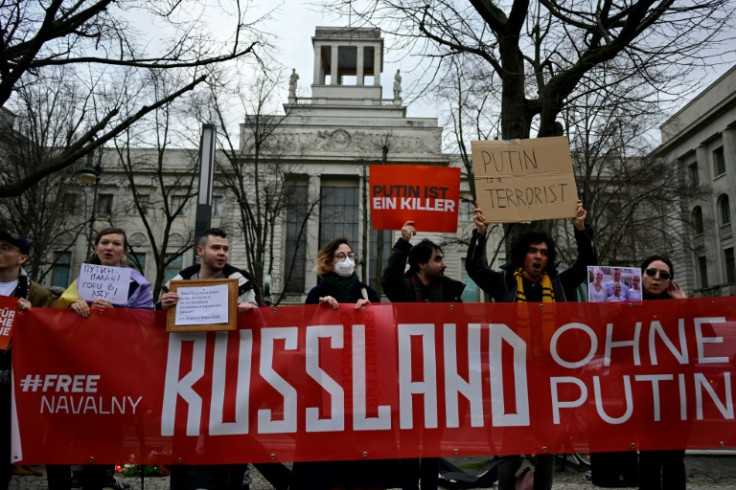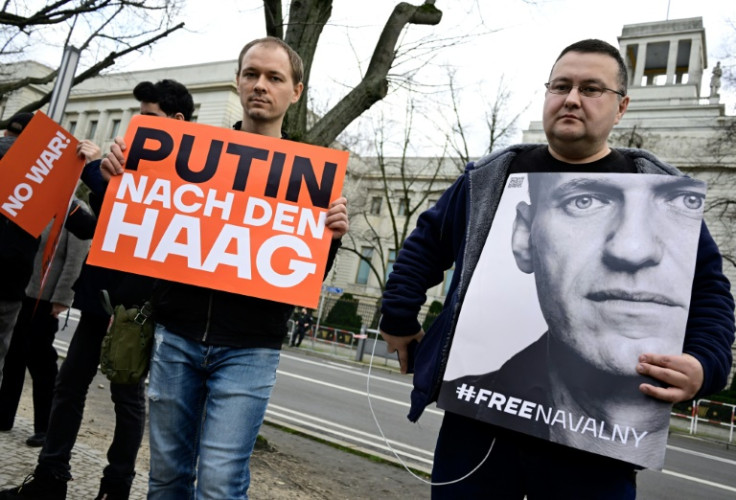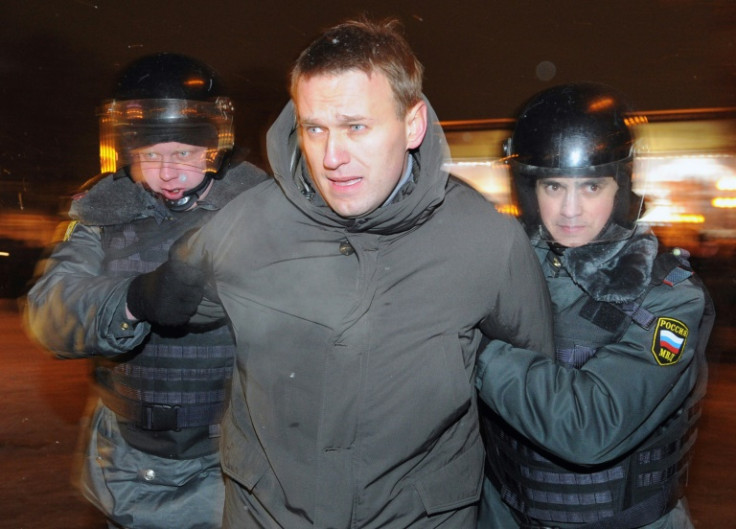Exiled Russians Mourn Navalny, Blame Putin For 'Murder'

Prominent Kremlin critics and ordinary Russians in self-exile blamed President Vladimir Putin for the "murder" of opposition leader Alexei Navalny Friday.
They argued that his death would make "immortal" and possibly a bigger threat to the Russian leader in death than in life.
Supporters of the man who was seen as Russia's most prominent prisoner were devastated, bringing flowers to Moscow's embassies in foreign capitals and planning rallies.
"Navalny's eternal", read a placard in front of the Russian mission in Copenhagen.
"Russia kills," said a placard held up by an activist in Paris.
Russian authorities said Friday that Navalny, 47, had suddenly died in his Arctic prison.
The shock announcement came as Putin is gearing up to extend his two-decade hold on power in a stage-managed presidential election in March.
Navalny, a charismatic lawyer, was widely seen as Russia's top opposition leader and the only politician able to muster huge crowds and take on Putin, 71.
Navalny coined the phrase "beautiful Russia of the future", and many saw him as a symbol for an alternative Russia respecting human rights and living in peace with its neighbours.
"What a nightmare!" exiled opposition politician Dmitry Gudkov said on social media.
"Alexei's death is a murder. Organised by Putin," said the 44-year-old, who together with Navalny for years rallied anti-Kremlin Russians at opposition protests when such demonstrations were still allowed.
"Even if Alexei died of 'natural' causes, they were caused by his poisoning and further torture in prison," said Gudkov.
Navalny barely survived a poisoning with the Soviet-designed nerve agent, Novichok, in 2020. Following treatment in Germany, he returned to Russia in 2021 and was immediately arrested and subsequently jailed.
His return marked a new wave of repression in Russia, and the last vestiges of dissent were crushed when Putin sent troops to Ukraine in February 2022. All prominent anti-Kremlin critics are either in jail or in exile.
Hundreds of thousands of Russians have left their country since Putin's invasion of Ukraine.
"There is nothing more the dictator can do to Navalny," said renowned Russian writer Boris Akunin, who lives in self-imposed exile in Europe.
"Navalny is dead and has become immortal," Akunin, 67, told AFP. "He will eventually bury Putin.
"I also think that a murdered Alexei Navalny will be a bigger threat for the dictator than a living one," he added.
Putin could now ramp up the crackdown to drown out remaining dissent and "launch a campaign of terror in the country", he added.
Akunin, whose real name is Grigory Chkhartishvili, said Navalny's passing was "a huge personal loss".
This past fall, Navalny, answering to Akunin from prison, said he believed in God and science. "I believe that Russia will be happy and free," he wrote. "And I don't believe in death."
Writer and journalist Mikhail Zygar said that many Russians had wanted Navalny to be elected president.
"He was our future for so long," the 43-year-old said on social media. "Now we don't have that future anymore."
Lev Ponomarev, a veteran rights activist who lives in Paris, said Navalny's passing was a challenge but Russians should continue to keep fighting for democracy.
"This is a historic event that should unite us all," the 82-year-old rights campaigner told AFP on his way to a gathering in front of the Russian embassy.
"There are still many of us," he added. "We need to act together."
However, political analysts say there is no unity among members of Russia's anti-Kremlin opposition living in exile and they cannot mount a meaningful challenge.
Former tycoon Mikhail Khodorkovsky, who spent a decade in prison in Russia and later frequently sparred with Navalny, said Putin was responsible for the opposition leader's "untimely" death.
He called on Russians to show up at polling stations on March 17 and write in Navalny's name on ballots in a show of defiance.
"If you did not know or were doubting about how to act on this day, then here's an answer for you," the 60-year-old exiled opposition politician said on social media.
Many ordinary Russians said they were in shock.
"I feel empty," said 45-year-old Olga Kokorina, who along with dozens of Russians gathered in Paris to mourn his death. Some held blue-and-white flags symbolising the Russian opposition.
Kokorina said that Navalny's death meant that Russian authorities would stop at nothing to crush dissent.
"This is no longer intimidation, but elimination," she told AFP.


© Copyright AFP 2025. All rights reserved.





















